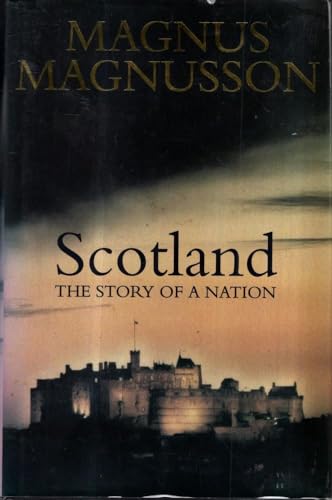Scotland: The story of a nation
Magnus Magnusson
About the Book
Description:
Buy with confidence! Book is in good condition with minor wear to the pages, binding, and minor marks within. Seller Inventory # bk000257148Xxvz189zvxgdd
About this title:
Synopsis: A vivid look at Scotland's long and difficult road to nationhood, re-exploring some cherished myths and unearthing a wealth of fascinating new detail. Magnus Magnusson's starting-point is Sir Walter Scott's classic version of Scotland's history, "Tales of a Grandfather". Since its first appearance in 1827-29, Scott's book has moulded the views of generations of Scottish schoolchildren. It told the story of Scotland from the point of view of a deeply patriotic Tory who believed that the nation's destiny had been fulfilled with the Union of Parliaments in 1707. Magnus Magnusson takes the reader through Scotland's history from the earliest Mesolithic settlers on the island of Rum to the establishment of the new Scottish parliament in 1999. In investigating the many questions raised by the nation's turbulent and often poignant past, he gives full weight to the "people's history" of Scotland - the living treasure of local legends and tradition which he believes has as much resonance as academic analysis. Where did the "Scots" come from? To what extent was Scotland shaped by the Viking raids and settlements? What happened to the Picts? What is the truth about such historical figures as Macbeth and William Wallace? Was Robert Bruce really inspired by a spider in a cave? What was the significance of the tragic reign of Mary Queen of Scots? Who were the Covenanters? What really lay behind the Massacre of Glencoe? What were the long-term effects of the 1707 Treaty of Union with England? What was the impact of Jacobitism, the '45 rising in support of "Bonnie Prince Charlie" and its brutal defeat at Culloden?
Review: Near Stirling, Scotland, stands a memorial to the warrior William Wallace, put to death at the orders of the English king Edward I in 1305. Within that memorial stands a glass case, and inside of it stands a broadsword 1.7 meters long. Legend has it that the hero himself wielded the weapon, and so "Wallace's Sword" it is.
Magnus Magnusson, a native of Iceland who has long lived in and written about Scotland, may spoil it for some readers when he writes that Wallace's Sword probably wasn't Wallace's. To use it, Wallace would have had to have stood at least 6-foot-6 in height and to have lived two centuries later. The business of the sword is just one of the "cherished conceptions" about Scottish history that Magnusson picks apart and then, corrected and improved, restores. At other turns he considers the true identity of the legendary king Macbeth (and entertains some surprising but plausible theories about the king's alter ego); reconstructs decisive battles such as Otterburn, Flodden, and Glencoe; and looks closely at the complicated negotiations (and, many would say, treacheries) that led to the union with England of 1707. Magnusson closes with an account of modern independence movements and the recent return of some measure of national autonomy, opening a "new chapter in a nation's story, which the people of Scotland are now beginning to write."
Lucid, witty, and unafraid of controversy, Magnusson's book does a fine job of condensing a complex history, stretching out for 10 millennia, into a single volume. --Gregory McNamee
Bibliographic Details
Title: Scotland: The story of a nation
Publisher: HarperCollins Publishers Ltd,
Publication Date: 2000
Binding: Hardcover
Condition: Good
